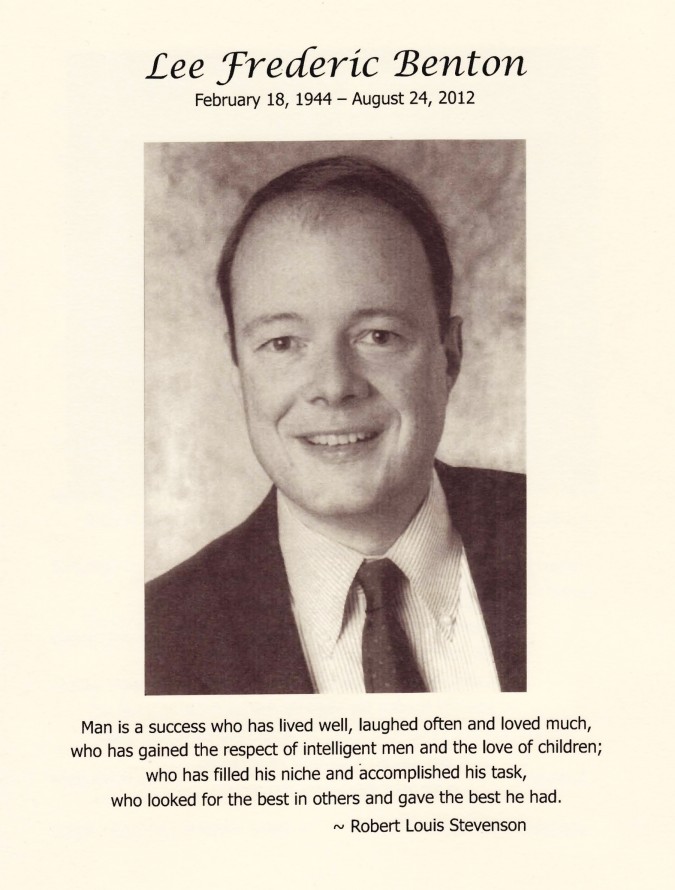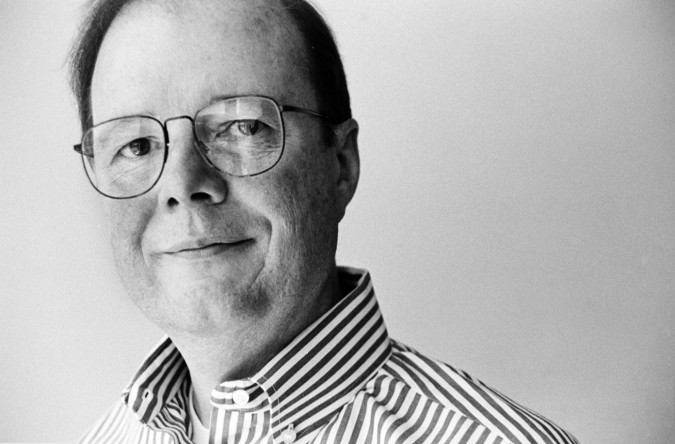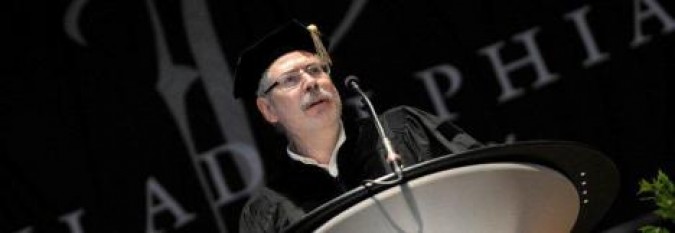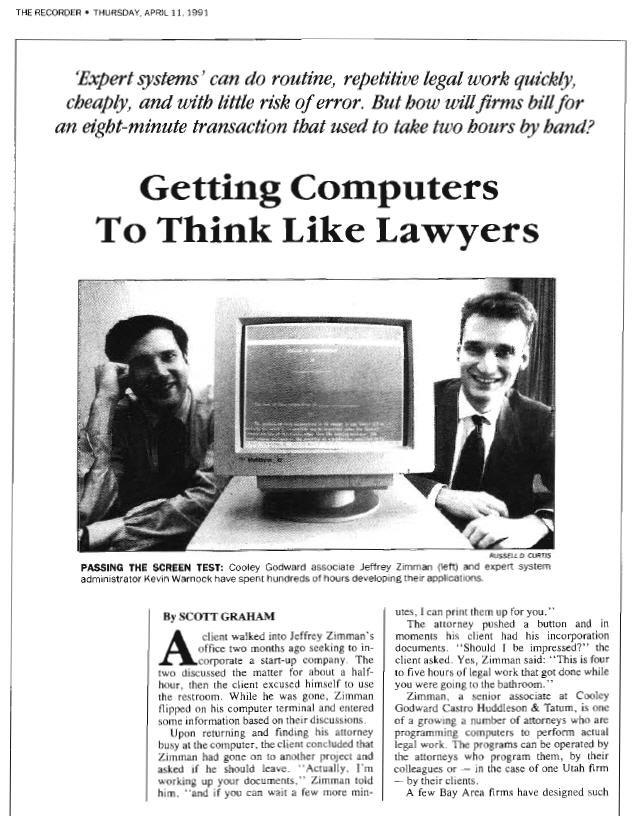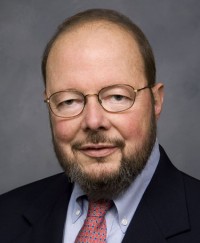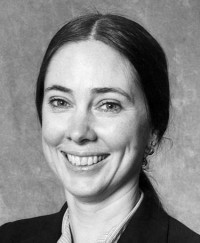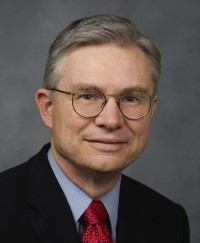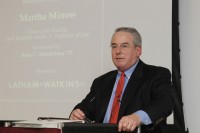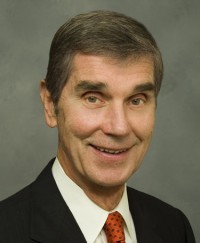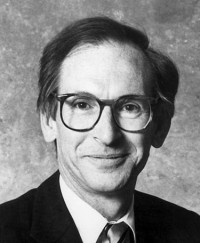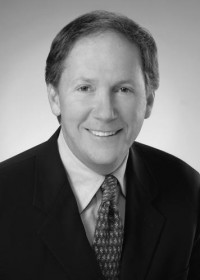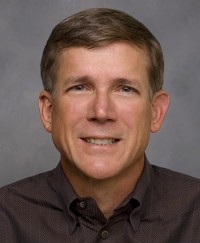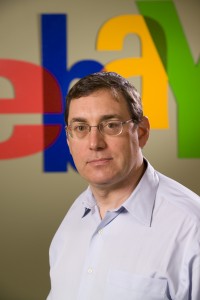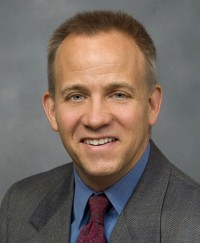Archive for the ‘Craig Dauchy’ tag
Memorial service for Lee Frederic Benton, October 6, 2012
My birthday was yesterday, October 6, 2012.
I will long remember this birthday because I attended the memorial service for Lee Frederic Benton, held at Holy Trinity Church, 330 Ravenswood Avenue, Menlo Park, California, USA.
Benton was born February 18, 1944 and passed away unexpectedly August 24, 2012.
I did not know Mr. Benton well, but he played a major part in my life. I was able in 2007 to tell him the facts that lead to this conclusion, but, sadly, I don’t believe I thanked him for his pivotal contribution to my success in life. Thank you Lee Benton.
In about 1991 I went to the offices of Analytic Legal Programs, Inc., founded by Eric Little. Analytic Legal Programs made a document assembly software program called WorkForm. At the time, I worked at Cooley, LLP, then named Cooley Godward Castro Huddleson & Tatum. Cooley had purchased a firm wide license for WorkForm, and had asked me to lead the project. Associate attorney Jeff Zimman was to program the first set of documents, a set of 17 documents to incorporate a company in California.
Since neither of us knew the WorkForm software, we both attended a several day training session at the offices of Analytic Legal Programs in Palo Alto, California USA.
Zimman left a voice mail for Benton during our training, and the subject was Zimman’s compensation at Cooley. From that I have guessed Benton supervised Zimman, and gave Zimman his assignments. I have further guessed that Benton authorized Zimman to spend the hundreds of non-billable hours that he would eventually dedicate to the document assembly project. Without Zimman, there would have been no document assembly project, because Zimman was the only attorney at Cooley that showed any interest in document assembly back then. Without Benton letting Zimman stop billing hours to clients for a time, there also would have been no document assembly at Cooley. As a result, without Benton, I would have never become an expert at document assembly, and I would thus have not started Hotpaper.com, Inc., the first Internet document assembly platform, in 1995. Had I not started Hotpaper, I would not have sold it in 2000, and I would not have been able to buy the house I am typing this post in, or to live my life I treasure so much that I write about on this blog.
Starting an Internet company that gets acquired is very difficult. I needed every advantage along the way to get to where I am today, and Lee Benton gave me a huge advantage. He freed up hundreds of hours of time of a rising star attorney, which ended up launching my career in high technology. I simply don’t think I would have gotten into the Internet business had it not been for Lee Benton and Jeff Zimman.
When I was at Cooley, Benton had not yet led the entire firm, but I knew that he would, because Helen Gaffney, since passed, told me so. Gaffney ran the firm’s Information Technology infrastructure at the time she said this, about half a decade before Benton became Managing Partner, the title the firm then used for its top leader. The firm now uses the title CEO for its top leader, and I learned yesterday that Cooley’s current CEO Joe Conroy, joined Cooley while Benton was Managing Partner, and that Conroy greatly admired Benton. Conroy attended Benton’s memorial yesterday, but I did not see him.
Lee Benton’s memorial service was very touching to me. I recognized some of the attorneys that were at Cooley when I left in 1994, including Frederick Baron, Pam Martinson, Alan Mendelson, Gordon Atkinson, Kenn Geurnsey, Paul Renne, James Gaither, Craig Dauchy and my own current attorney Eric Jensen. That this group attended was amazing to me, because I actually received material help on my project in the 1990s from Baron, Martinson, Mendelson, Guernsey, Renne and Jensen. I hadn’t seen Martinson, Dauchy, Atkinson or Gaither since 1994, but I recognized all of them, and they appeared to recognize and remember me when I greeted them. Sadly, Martinson and Mendelson left before I got to say hello to them. I most recently saw Mendelson by chance at Nordstrom in 2008 when I was trying on tuxedos for my wedding.
My friend Tom Kintner was also there, and I learned Kintner worked with Benton and others on the USD $621 book Venture Capital & Public Offering Negotiation. ‘This book is the leading authority on the legal aspects of venture capital funds and of private financing and initial public offerings for technology companies,’ per Cooley’s website. I have known Kintner for over a decade, and I never knew he knew Lee Benton until yesterday.
When I said hello to Paul Renne, I had the great pleasure of meeting his wife, former San Francisco City Attorney Louise Renne.
Benton was revered when I was at Cooley, and although I only spoke with him perhaps half a dozen times in the five years I worked at Cooley, I always knew he was extremely influential. I once had to modify the California Incorporation document set to incorporate his changes, and I vividly remember thinking at the time that they were the most impressive set of edits I had yet seen from any attorney. Even though I am not and have never been an attorney, I had by then developed an ability to identify precise and impressive edits, and Benton’s were outstanding. His dozens of edits made the documents more conclusive without being stern.
Frederick Baron spoke at the memorial. His written remarks were poignant and lovely — so much so that I suggested he post them online for posterity. If he finds this post and thinks this is a suitable place for his remarks to live on, I invite him to forward them to me for incorporation into this post, which I am happy to revise.
One of the stories Baron relayed was so sweet that I am going to relay it here.
Baron told the story of how he arrived at Cooley. He moved to the San Francisco Bay Area and knew of Lee Benton’s stature. He heard Cooley had just opened an office in Palo Alto, its first branch office. The firm was founded in San Francisco. Lee Benton was part of the first group of Cooley attorneys that opened the Palo Alto office. Baron applied to Cooley and got an interview with Benton himself. The story takes a charming turn when Baron told us yesterday that his son, age 4 at the time, rode in a car pool to school starting the day before Baron’s interview with Benton. Using more descriptive language than I will here, Baron described his 4 year old son as a boisterous handful. Baron was alarmed when he learned the night before his big interview with Benton that the driver of his child’s car pool was Lee Benton himself.
As you can guess, the interview went well and Baron was hired despite his fears that his rambunctious son might have harmed his chances. Frederick Baron went on to lead a department for decades.
Baron and Benton and their wives all became dear friends.
One of Lee Benton’s clients, Bob Plaschke, also spoke. He told a series of stories that elicited hearty laughs from the audience. He also spoke affectionately about Benton’s laugh, which he described as infectious, distinctive and highly memorable. I never heard Benton laugh because in total I probably spent no more than 30 minutes speaking with him, the most recent 10 minutes at a party at Cooley in 2007, when I got to have a very nice conversation with him despite the absence of laughing.
Plaschke told a great story about when one of his companies was doing a closing for a transaction. The closing happened on a weekend, and Benton dropped by the Cooley office where other attorneys were completing the work. However, Benton wanted to pitch in and help, and he asked a young associate how he could contribute. Plaschke said this young female associate tried meekly to decline Benton’s offer, but Benton persisted. Finally, using her hands that were trembling with fear, she handed a document she had written to Benton and asked him if he would review it for her. Benton enthusiastically attacked the document with his red pen, and when complete, there was red ink on every line of the four pages. Plaschke said Benton was so pleased to be able to help, and that he saw Benton commend the young associate on how well she had handled the delicate representations and warranties section.
This is such touching story for me, so much that it brought tears to my eyes as I wrote it. Benton clearly didn’t even need to be at the office for the closing, since there were others there already handing things. But Benton cared for his client’s interests, and wanted to make sure things were OK. He insisted on helping, and used the opportunity to do well for his client and to help train a young attorney, who no doubt remembers that weekend encounter with Benton.
We are all here on Earth for such a short time. How well we treat others defines how we will be remembered. How we treat those far below us in rank particularly defines how we will be remembered. All of the speakers yesterday conveyed that Lee Benton was an exceptionally kind, humble and conscientious man. He got a lot done in life while warming the hearts of those around him. Many others get a lot done while trampling over people without remorse. I consider Lee’s approach by far to be the gold standard for how to live.
Thank you Lee Benton for all that you accomplished and all the love that you extended during your exceptional time on Earth.
Here is the obituary for Lee Frederic Benton, as published in the San Francisco Chronicle newspaper on September 9, 2012:
Lee Frederic Benton
Lee Benton passed away in Palo Alto on August 24, 2012 at the age of 68 due to complications following surgery.
Born on February 18, 1944 in Springfield, Ohio, Lee was the son of the late Robert and Candice Collins Benton. He was a graduate of Oberlin College and received his J.D. from The University of Chicago, where he served as the Executive Editor of The University of Chicago Law Review. Lee was a teaching fellow at Stanford Law School before joining the San Francisco office of Cooley, LLP in 1970.
Lee was a founder of Cooley’s Palo Alto office in 1980 and was managing partner from 1996 to 2001. He was a partner at the firm from 1975 until 2006 and then served as senior counsel. During his distinguished legal career he focused on the formation, financing and growth of high technology companies. While at Cooley he also served as general counsel and a member of the senior management teams of two publicly traded technology companies.
In addition to being an accomplished practitioner, he was a dedicated mentor to a generation of lawyers who value his legacy. Reflecting on what Lee stood for in his life and work, one colleague wrote, “success does not have to come at the expense of decency and humanity or be coupled with the sacrifice of principle or soul.”
Lee was a deeply thoughtful, kind, and caring man. In recent years he faced several health challenges with an indomitable spirit. Drawing from these experiences and the expertise he acquired, he was tireless in extending his help to individuals and institutions. He served on the Board of Directors of the National Headache Foundation, as a Strategic Advisor to the California Institute for Quantitative Biosciences (QB3).
He took great pleasure in his unique array of hobbies. Some of his extensive collections and research included commercial aviation, single malt scotch, classical music, and country music. He was, as well, an avid and vocal follower of sports and politics.
Lee was a loving husband and father and is survived by his wife Susan, sons Timothy and Matthew, brothers Marc (wife Trish) and Bruce (wife Andrea), and brother-in-law David Wann.
On Saturday, October 6 at 1:00 pm, a memorial service to celebrate Lee’s life will be held at Trinity Church, 330 Ravenswood Ave., Menlo Park. For contributions in his memory, the family suggests the National Headache Foundation, 820 N. Orleans, Suite 411, Chicago, IL 60610.
Here is the August 27, 2012 press release from Cooley’s website:
We are saddened to announce that Cooley former Managing Partner and long-time colleague Lee F. Benton passed away last week.
Lee began his career at Cooley in 1970, and was a partner of the firm for more than 30 years. He served as Chair of the Business Department from 1994 to 1996, and was the Managing Partner of Cooley from 1996 to 2001. At the time of his death, Lee was Senior Counsel to the firm.
In addition to his formal leadership roles, Lee played a significant part in establishing Cooley as one of Silicon Valley’s most respected and important law firms. Lee was among the first of our lawyers to move from San Francisco to Palo Alto to open our first office there in 1980.
Lee was a brilliant practitioner and a highly regarded speaker on the topics of securities law, venture capital, mergers and acquisitions and strategic partnering. He took immense pride in his work and was a great teacher of generations of Cooley lawyers. He devoted himself to the success of his clients, even serving as general counsel and a member of the senior management teams of two publicly traded technology companies. Lee also served on a volunteer basis as Strategic Advisor to the California Institute for Quantitative Biosciences (QB3) and on the Boards of Directors of Sonim Technologies, Inc. and the National Headache Foundation.
Lee was truly instrumental in building the firm we are today. His legacy will be a lasting one and he will be deeply missed.
Our thoughts and prayers are with his wife Susan and their family during this difficult time.
Here is Lee Benton’s biography from Cooley’s website, as of October 7, 2012
Lee F. Benton was a partner in the firm from 1975 until 2006, and then served as senior counsel in the Securities Regulation group until his death in 2012. He was the managing partner of the firm from 1996 to 2001 and chair of the firm’s business department from 1994 to 1996. He commenced his career in Cooley’s San Francisco office in 1970 and founded the firm’s Palo Alto office in 1980. He is listed in The Best Lawyers in America, in “The Best Lawyers in Silicon Valley” in San Jose Magazine, in Marquis Who’s Who in America and in Madison Who’s Who in the World.
Mr. Benton’s practice encompassed a broad spectrum of fields related to the formation, financing and growth of high technology companies. He represented high technology firms from their inception through maturity as publicly-traded corporations. Mr. Benton also represented a large number of venture capital firms. His particular areas of expertise included strategic partnerships, equity incentives, initial public offerings, securities law, mergers and acquisitions, and cross-border transactions.
While at the Firm, Mr. Benton also served as general counsel and a member of the senior management teams of two publicly-traded technology companies.
Mr. Benton was the executive editor of The University of Chicago Law Review from 1968 to 1969 and a teaching fellow at Stanford Law School from 1969 to 1970. Mr. Benton authored numerous articles and lectured extensively for the Practicing Law Institute, California Continuing Education of the Bar and Aspen Law and Business Inc. His topics included securities law, venture capital, M&A and strategic partnering. He is a co-editor and co-author of Venture Capital and Public Offering Negotiation (Aspen Law and Business, Inc., 2002). This book is the leading authority on the legal aspects of venture capital funds and of private financing and initial public offerings for technology companies.
Mr. Benton served on a volunteer basis as a strategic advisor to the California Institute for Quantitative Biosciences (QB3) and on the boards of directors of Sonim Technologies, Inc. and the National Headache Foundation.
Education
- University of Chicago Law School
JD, 1969, Order of the Coif - Oberlin College
BA Government, 1966, magna cum laude
Admissions
- California
Memberships
- American Bar Association
Here is Lee Benton’s obituary published August 28, 2012 in The Recorder newspaper (link):
SAN FRANCISCO — Lee Benton, a former managing partner of Cooley during the heady years of the dot-com boom, died Friday due to complications following surgery. He was 68.
Benton had been with the firm for more than 30 years and held several top leadership positions. He chaired Cooley’s business department from 1994 to 1996 and served as managing partner from 1996 to 2001. He was senior counsel at the time of his death.
Benton was a dedicated, meticulous and well-respected attorney who played a key role in establishing and building Cooley’s presence and reputation in Silicon Valley, long-time colleagues said. He was among the first group of lawyers who relocated from San Francisco to open the firm’s first Palo Alto office in 1980.
“He really is one of a handful of people who reshaped our firm into what it is today,” said Frederick Muto, chair of Cooley’s business department who’s been with the firm since 1980. “He helped establish us as one of the Valley’s most important law firms. And he was just a great lawyer and a terrific mentor.”
Benton, who helped take Genentech Inc. public in 1980, was considered an expert on securities law, venture capital, mergers and acquisitions and strategic partnering. Thirty years ago, he co-authored a groundbreaking treatise on the legal framework for venture capital financing that’s still used today, colleagues said.
“He was regarded as truly a lawyer’s lawyer,” said Cooley litigation partner Frederick Baron. “He was puckish and brilliant. He was a person of tremendous attention to detail, and clients loved the fact that he turned over every stone to identify and minimize every conceivable risk.”
He was also fiercely committed to helping Cooley grow. As head of the business department and managing partner of the firm, Benton not only helped it become a major player in Silicon Valley. His leadership also helped the firm weather the tough times after the dot-com bubble burst and several high-profile attorneys departed, said James Fulton Jr., co-chair of Cooley’s clean energy and technologies group.
Benton was devoted to both clients and colleagues alike, Fulton said. He was one of the first lawyers at Cooley to take a leave of absence to serve as a general counsel to his clients, such as Santa Clara-based Ungermann-Bass, one of the earliest large computer networking companies.
“He was a beloved counselor,” Fulton said. “People didn’t come to Lee time and again just because he was a good lawyer. So many people who worked with him were personally touched by him. There was his willingness and ability to mentor, on nights, weekends.”
And Benton always made time to help young lawyers, said Wilmer Cutler Pickering Hale and Dorr corporate partner Daniel Zimmermann. Benton began mentoring Zimmerman when he was a young associate at Cooley, and they’ve been friends ever since, he said, sharing practical jokes and conversations over breakfast whenever possible.
“He was someone who always took a difficult situation and turned it into a lesson,” Zimmermann said. “He was just a very kind person who was incredibly meticulous about his work and his relationships.”
A memorial service for Benton will be held Oct. 6 at 1 p.m. at Trinity Church in Menlo Park.
Editorial note: Normally I place many hyperlinks in my posts. I have chosen not to do that for this post, except that I did link the The Recorder article, where I encourage you read the text I copied to this post. I copied the obituaries so that they will be readable for decades, even if the original sources disappear. I hope that the authors of the text I copied do not object. My goal is for this post to endure in its entirety.
Steve Blank’s Philadelphia University commencement address
Here is the best commencement address I have ever heard or read. It’s by Steve Blank. I’ve written about Steve Blank and his writing before.
I consider his Four Steps to the Epiphany book to be the most important book for entrepreneurs to read.
Blank gave this speech May 15, 2011 at the commencement for Philadelphia University.
Here’s one story from the speech that particularly resonates with me. When Blank was a young man he was in the United States military. He volunteered to go to Thailand and he kept volunteering once he got there. His enthusiasm and curiosity paid off, as you’ll see:
“Once again, I was going to see where the road would take me. Volunteering for the unknown…which meant leaving the security of what I knew…would continually change my life.
Two weeks later I was lugging heavy boxes across the runway under the broiling Thailand sun. My job was to replace failed electronic warfare equipment in fighter planes as they returned from bombing missions over North Vietnam.
As I faced yet another 110-degree day, I did consider that perhaps my decision to leave Miami might have been a bit hasty. Yet every day I would ask, “Where does our equipment come from… and how do we know it’s protecting our airplanes?”
The answer I got was, “Don’t you know there’s a war on? Shut up and keep doing what you’re told.”
Still I was forever curious. At times continually asking questions got me in trouble…
once it almost sent me to jail…
but mostly it made me smarter.
I wanted to know more. I had found something I loved to do.. …and I wanted to get better at it.
When my shift on the flightline was over, my friends would go downtown drinking. Instead, I’d often head into the shop and volunteer to help repair broken jammers and receivers. Eventually, the shop chief who ran this 150-person shop approached me and asked, “You’re really interested in this stuff, aren’t you?” He listened to me babble for a while, and then walked me to a stack of broken electronic equipment and challenged me troubleshoot and fix them.
Hours later when I was finished, he looked at my work and told me, “We need another pair of hands repairing this equipment. As of tomorrow you no longer work on the flightline.” He had just given me a small part of the electronic warfare shop to run.
People talk about getting lucky breaks in their careers. I’m living proof that the “lucky breaks” theory is simply wrong. You get to make your own luck. 80% of success in your career will come from just showing up. The world is run by those who show up…not those who wait to be asked.
Eighteen months after arriving in Thailand, I was managing a group of 15 electronics technicians.
I had just turned 20 years old.”
I think most success people have is the result of them doing more than is expected, and I admire Blank for selecting such a concrete example from his past to illustrate this point.
While I’m mentioning important books, the book I consider the second most important for entrepreneurs to read is The Entrepreneurs Guide to Business Law, by Craig E. Dauchy and Constance E. Bagley. I used to work with Dauchy at Cooley LLP. He’s one of the most respected members of that firm, so I place a lot of faith in what this book has to say.
It was 20 years ago today that I got my picture in The Recorder while I worked at Cooley LLP
Twenty years ago today I was working on Cooley LLP’s document assembly software development effort.
On this day April 11th in 1991, the project was featured in a lengthy article in The Recorder, a San Francisco newspaper for the legal profession. Here’s the PDF scan I made from the paper copy of the article I’ve saved for the last two decades: Getting Computers To Think Like Lawyers – The Recorder – April 11, 1991.
That was a big day for me, as non lawyers at law firms almost never receive any attention from the press. It was also a big day for my project because Kenn Guernsey, Cooley’s Managing Partner at the time, left Jeff Zimman and me a nice voicemail congratulating us for our work. Zimman was the attorney that got the project off the ground by personally programming Cooley’s first document set, and without him, I wouldn’t have likely started Hotpaper.com, Inc. or later created the first online office suite, gOffice. Hotpaper was the first online document assembly application. The application was live on the Internet in 1997, two years before I changed the name of the company from Document Automation Systems LLC to Hotpaper.com, Inc. I licensed this online document assembly software to 30 of the Fortune 500, which I was proud of given my company at the time consisted of just me.
I run into Zimman on the San Francisco MUNI every year or so. He made partner at Cooley in six years I believe, and later became an investment banker at Lazard Ltd. Now he is Chair of Posit Science, which makes computer software that helps improve mental functions. It’s really interesting to me that we both became entrepreneurs after our stints at Cooley.
I credit Cooley with teaching me to be an entrepreneur, because starting such an innovative project inside a law firm is VERY difficult. The computer department isn’t normally charged with embedding the expertise of lawyers into software, so they don’t really know the lawyers. I got to know the lawyers because I needed to get the software to mimic lawyers. I spent a lot of energy hounding the lawyers with questions that must have seemed so simple to them. Zimman was a quick learner, and didn’t need much of my help to build the document models. But Zimman had to return to his lawyer duties after creating a few sets of documents, so I had to personally recruit new lawyers to get involved. I got help from some of the top lawyers at the firm at the time, including Hank Barry, who would later testify before the United States Senate when he was the Interim CEO at Napster.com at the height of its notoriety. Alan Mendelson, Paul Renne, Tony Gilbert, Lee Benton, Dan Frank and Susan Philpot were also instrumental to getting the project as far along as we did. I couldn’t find Dan Frank on the Cooley website so I’m not sure where he works now.
Perhaps the most actively helpful contributor to answering my many legal questions was Eric Jensen. He was a young hotshot associate at the time. I think Eric started at Cooley in 1988. I started at Cooley in 1989. Jensen would return my phone calls in 30 minutes. This was astonishing, as he was working like crazy in Cooley’s Sand Hill Road office with super lawyers Mark Tanoury and Craig Dauchy. Other lawyers that answered my questions, like Michael Jacobson, would often take days or weeks to return my calls, but Jensen usually got back to me in 30 minutes. We became good friends, and I fondly recall working with him. I would even go to the Sand Hill Road office on occasion to meet in person with Jensen. Jacobson was an outstanding question answerer by the way, and he went on to strike it rich as the top lawyer at EBay. He wrote me an enthusiastic letter of recommendation when I left Cooley.
When Cooley eliminated my position of project leader for its document assembly efforts during the recession of 1994 I was devastated. The whole project quickly died and the lawyers had to stop using the time saving software, which could allow an attorney to complete 4 hours of work in 20 minutes. The reason the software couldn’t be used indefinitely is the text of the documents in law firms is constantly being improved. So to keep a document assembly system useful, someone needs to apply those language updates to the software. Once I was gone, there was nobody to implement these upgrades, so the system couldn’t be trusted to produce the firm’s latest thinking. At the time Cooley’s attorneys and staff all used a Digital Equipment Corporation VAX minicomputer cluster via dumb terminals, and the document assembly software ran under the Open VMS operating system used on the VAX. So it was not a simple matter to train someone to take over the text update maintenance of the system.
New applications were out of the question, because without an ‘intrapreneur’ to recruit and encourage attorney experts to turn over their expert knowledge, they would not do it. At the time, the computer staff were housed alone with the accounting staff in a building blocks from where the attorneys worked, so there was no opportunity for the computer staff to get to know or make friends with the lawyers.
I feel bad that my project died, but I consider it one of the luckiest breaks of my life that my position was eliminated.
Otherwise, I might never have become an entrepreneur, and my life would not have been as exciting as it’s been. It was tough on me when Cooley’s Executive Director Ken Sargent (anyone know where he is these days?) broke the bad news and helped me pack my things, but it was a highlight of my professional life. The attorneys I helped felt bad for me that I had worked so hard and then lost my job, so they helped me get started in my own business by finding me my first client and effectively vouching for me. That client, Silicon Valley Bank, paid me $30,000 and got me off to the races. My next client was Bank of America.
It’s funny to recall that one of the young associate attorneys down the hall from me advised me to sue Cooley for letting me go!
I didn’t even consider suing Cooley. Instead, I kept my head high, didn’t complain or vent to anybody beyond my closest friends, and did my best to stay on excellent terms with everyone there, non attorney staff included. Cooley paid me a nice severance package. Had I sued and somehow gotten a few extra dollars, I am 100% certain those dollars would have been ‘nothing’ compared to the value of their help in getting me established in business. In 1999 when I raised $2 million in venture capital from Blue Run Ventures, I was able to get Jensen to represent Hotpaper. His representation was key to the modest success I had with Hotpaper, and to the modest exit for $10 million 14 months later. What some readers may not know is that in 1999 is was nearly impossible to hire a good lawyer. Lawyers needed to be won over via pitching back then, and they were very selective in taking new clients. Getting a firm as impressive as Cooley was difficult, even if you did raise venture capital money. Getting a lawyer like Jensen was nearly impossible. Had I sued Cooley, I would not have gotten them to later represent me, and who knows what would have happened. I am very much against suing in general, as it doesn’t help most of the time.
My advice is to never sue your employer if they eliminate your position! I didn’t have any basis to sue anyway, as they didn’t do anything illegal. It’s illustrative to note that the attorney at Cooley who advised me to sue never made partner and is no longer there.
It’s so much better to leave nicely and stay friends.
It’s a very small world, and the people you know today you will likely still know 20 years from now. I can’t believe how fast 20 years just flew by.
I’ve stayed in touch with my attorney friends from Cooley, and Eric Jensen has been my attorney since 1999. He now leads Cooley’s business department, which accounts for a majority of the firm’s revenue, to my knowledge. Although Jensen wouldn’t say so, he’s what I consider to be one of the best attorneys in the United States. I’m grateful he continues to work with me, as my company must be one of his smallest clients. I have sent my friends to Jensen, including Priya Haji who started World of Good, Inc. which she later sold to EBay and Charity USA, and Andrew McCraith, who started and raised $15+ million in venture capital for Silicon Clocks, which was later acquired by Silicon Labs.
I have received glowing reports from everyone I’ve referred to Jensen.
On this 20th anniversary, I want to thank everyone I’ve ever known at Cooley, including Ben Studebaker who hired me in 1989 and the late Helen Gaffney who promoted me about 6 weeks after I arrived into a position that allowed me the freedom to become an intrapreneur and work on Cooley’s document assembly project. I only knew Studebaker for a matter of 6 weeks or so. I worked very hard during those first six weeks, one night staying several hours past my quitting time to finish a large project assigned to Gaffney by Susan Philpot. I got it done the day it was assigned and it was on Studebaker’s desk when he arrived in the morning. Philpot was and probably still is a feared partner at Cooley, and I’m sure Gaffney and Studebaker appreciated my quick work. I never mentioned I stayed overtime, and I never charged Cooley for the extra effort. But I think it had something to do with Studebaker offering me his job, which included supervising the spending of $500,000 per year, after about 6 weeks on the job. He had been at Cooley for a long time – at least 10 years I recall. He cashed out some of his retirement plan to attend Harvard Divinity School, where he had been accepted. He didn’t seem the type for either divinity school or Harvard. He did seem like he would make an outstanding religious leader, however, as he had an immensely likable personality and was very well thought of at Cooley. I certainly admired his conviction and risk taking. I wonder what became of him, and if he should find this post I hope that he will write to me and fill me in on how his life turned out. Thank you Ben, for you changed my life.
I want to remember my friend Sandy Price, perhaps the first attorney I met and talked with at Cooley. I had only been there a couple of days and I was there late and needed to make a photocopy. I didn’t have an access code yet, and I had to ask Price to activate the photocopy machine for me using her Equitrac accounting device code. Price worked really late almost every night… near midnight lots of nights. I’m still friends with her, and had lunch with her earlier this year. Her hard work paid off, as she’s been named a Super Lawyer every year since 2004. Price is now a partner with Sideman and Bancroft LLP, and if you need an estate planning attorney, I doubt you could find a better lawyer to help you.
I also want to remember my friend James Pirie, who reported to me for a while and who graciously agreed to handle some of my responsibilities so I could work harder on the document assembly project. He put himself at some risk by doing this. He never got in any real trouble though, to my knowledge, and Ken Sargent, the Executive Director, privately congratulated me for delegating what I could to Pirie, saying it was the only way to ‘get things done.’ I trained Pirie to do things he would have never normally learned in his job at the time, and I had complete faith in his ability to safely handle these sensitive computer tasks.
I also want to thank Bill Bradshaw, who handled purchasing of supplies for the San Francisco office. He was an extremely patient friend, and although I’ve lost touch with him, I fondly remember our friendship.
I want to acknowledge Carole Hearn, Cooley’s Director of Finance. I think she’s been there some three decades now. She spent hours educating me about office politics, trying very hard to help me navigate a path that was obscure to a bright eyed 25 year old who had never worked in a law office before. I hear from Hearn every so often, and the last time I saw her in person, about 10 years ago, she gave me a big hug.
I also want to thank Susan Newberry, then the Administrator for the San Francisco office. She’s still at Cooley, with more responsibility. Newberry and I fought, and I ultimately had to lobby to change my reporting relationship so that I reported to a special committee called the Document Automation Committee. This committee consisted of partners Zimman, Barry and Philpot. To my knowledge, the only other non attorney at Cooley that reported to a committee of partners was Sargent, the Executive Director. Even though my battles with Newberry were exasperating and stressful, it was educational and beneficial to have had to do battle with her. Her decades long tenure at Cooley is testament to her political skill and courage.
What’s interesting about these political battles is that they really helped me prepare for later battles with far bigger stakes, involving millions of dollars. Thus, Cooley really did help educate me to be a successful entrepreneur, as I don’t think high stakes office politics can be learned in school.
I credit my political skill with my being able, as the sole founder, to take my startup Hotpaper.com, Inc. from idea through to a $10,000,000+ acquisition.
In my experience, Cooley really does live by its values and vision, and I am a product of the firm’s many good deeds.
My 5 years at Cooley were instrumental to my professional growth and success.
Thank you Cooley.
